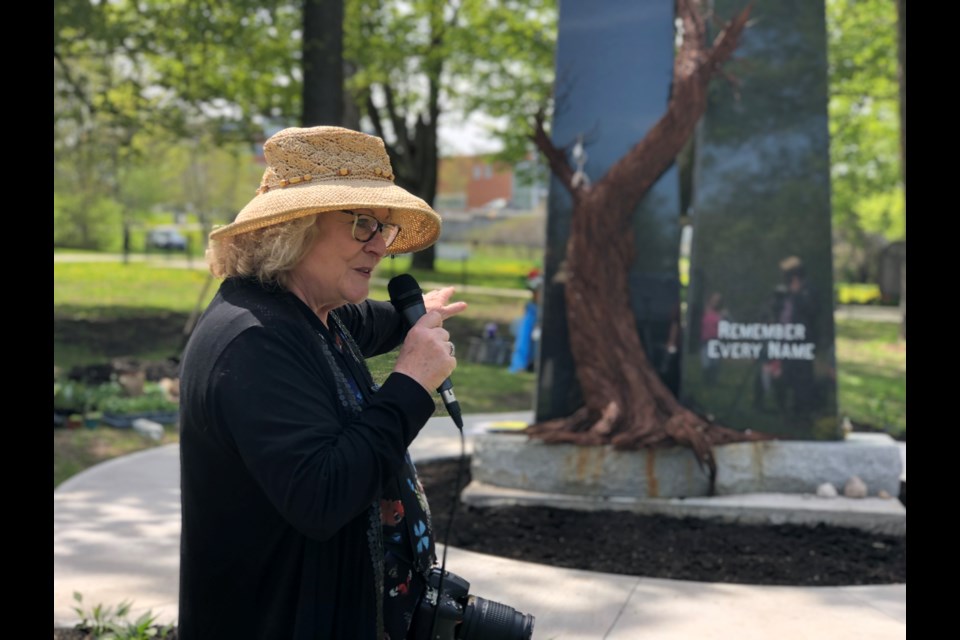Survivors of the long-shuttered Huronia Regional Centre in Orillia gathered Sunday for the first Mother's Day memorial in four years to both support the accomplishments gained by survivors and their allies as well as a way to honour the more than 2,000 people who, it is estimated, were laid to rest at the facility's cemetery.
In the midst of the event alongside a stunning memorial sculpture now surrounded by new granite benches and an accessible walkway, a sundog rainbow appeared in the sky overhead.
One bench is engraved with “If these walls could talk,’ celebrating the lives some survivors have managed to lead since leaving HRC. The second reads “Remember every name,” in honour of those who perished at the facility, many of whom are buried with numbered markers in the sprawling cemetery along Memorial Avenue.
Many survivors, supporters and allies participated in the planting of perennials into the worked soil and, one by one, survivors told their story, some describing the abuses they endured, before talking about the lives they’ve since managed to live.
“I should not have been here and I think many of you here should not have been here as well,” Jack White, who spent his childhood at the Orillia facility for developmentally disabled children which closed in 2009, told the small gathering. “Keep fighting, keep the spirit going.
“This was not a facility for people, it was a drop-off centre for people they gave up on.”
Many paid tribute to Marie Slark and Patricia Seth as well as their supporters, Marilyn and Jim Dolmage, who helped drive the class action that finally brought recognition to some of the atrocities that occurred over several decades at the residential facility.
Debbie Vernon found herself advocating for former HRC residents when three of the women asked for her help in filing their application as part of the class action which was eventually settled.
Vernon, now a Bracebridge municipal councillor, had worked at HRC for a short time in the late 1970s for a year. When the Muskoka Region Centre closed she found herself working again at the HRC, this time for about six years, as a residential staff member until she was deemed surplus in 1999.
“I knew what conditions were like and I knew how the residents were treated,” said Vernon, who felt compelled to further support survivors.
While HRC closed in 2009 the vast Orillia property along Lake Simcoe is maintained and is partially used by the provincial government.
There is an on-site cemetery but there were numbers on many of the grave markers instead of names. That prompted a move to encourage the proper identification of those buried there which resulted in the Remember Every Name website, an exhaustive clearing house of information related to the HRC.
Brian Logie has made the trek back to Orillia from his home in Campbellford many times, but declared that this would be his last.
“I’m not coming back,” he declared, wanting to put those nearly four years of abuses in the 1960s in his past.
Pat Caissie, her partner Doyle Moyer and her brother, Tom Titus, came to the cemetery Sunday on what would have been their mother’s 100th birthday and stumbled across the activities.
Growing up, they knew very little about their older brother, Timothy Siddall, who lived at HRC from 1946 to 1957, dying at the age of 15. After their mother died they set out in search of information, which included accessing his records.
“After my mom passed away we decided to come up here,” explained Caissie.
The two then created a marker with his name and had it placed next to the numbered marker at his gravesite.
Theresa Flaherty came from Ottawa with her daughter Sunday to honour her brother Eddy who lived at HRC for seven years until the year before it closed.
While he came home frequently, he was nonverbal. The Flahertys thought he was in a good place and didn’t learn about the horrible stories until the class action was launched.
The survivors and their allies pledge to continue to talk about and gather to ensure an awful chapter in Ontario’s history is not forgotten.



